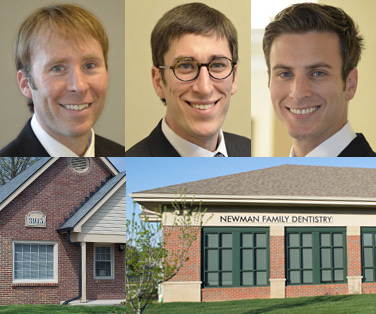Tooth Extraction Indianapolis & Carmel, IN
Keeping your natural adult teeth is usually the best option for preserving the health of your mouth. As much as possible, the dentists at Newman Family Dentistry will work to repair teeth from damage or decay. But sometimes it is impossible to restore a tooth that is too heavily damaged. In those cases, your dentist may perform a dental extraction.
Reasons for extraction
Dental extractions are almost always the last resort. Some possible reasons for the removal of a tooth include:
Extensive damage: If the tooth structure has been badly compromised by decay or by accidental damage, there may not be enough structure to support fillings or other restorative dentistry options.
Infection: Tooth decay can extend to the pulp, the fleshy core of the tooth, and cause an infection. We may be able to save the tooth with root canal treatment, but in many cases we will have to remove the tooth to alleviate pain and prevent the spread of the infection. Even when a tooth is not badly infected, if you have a compromised immune system, that may make it necessary to preemptively remove the tooth before infection occurs.
Gum disease: Teeth which have become loose due to infection of the gums may need to be removed.
Crowding and improper tooth growth: Occasionally, a tooth fails to grow in properly due to the size and positioning of other teeth around it, or can grow in a harmful direction. This is often the case with wisdom teeth, but may also occur with other adult teeth. This is sometimes fixable using orthodontic procedures, but can otherwise require the tooth to be extracted. Your dentist can advise you as to the best option in your case.
The extraction procedure
If your dentist recommends a tooth extraction, the process is simple. You will have an opportunity to discuss options and ask any questions before we begin. The process starts with an anesthetic to numb your mouth. The dentist will then pull the tooth, using care to protect the surrounding gums and teeth. You will still feel pressure during the procedure, but there shouldn't be any pain. After your tooth is removed, you will be given instructions on how to protect the site of the extraction while it heals. You may be prescribed medication to manage pain during your recovery. The pain should not be difficult for more than 24 hours.
Wisdom teeth removal
The four hindmost molars in the human mouth are the last to appear and can cause problems in oral health if they are not properly monitored. Wisdom teeth usually erupt around age twenty. While it is possible for them to grow in normally without causing crowding, complications are common and often call for extraction. If your wisdom teeth are beginning to emerge, you should make an appointment with your dentist to evaluate whether they should be removed.
Replacing missing teeth
After a tooth has been extracted, the gap can and should be filled to prevent your other teeth from shifting and the loss of bone tissue in the jaw. The most effective and natural-looking option is a dental implant, a small metal post anchored in your jawbone which can be used to support a replacement tooth, a fixed bridge, or a full denture. In many cases we can place your implants and install the replacement tooth the same day as the extraction.
Contact us today
If you believe you may need a tooth removed, schedule an appointment with Newman Family Dentistry today. We'll carefully examine your tooth to determine if there is a reasonable chance of saving it by another method. If your tooth does require extraction, we'll do it carefully and gently, and discuss options for replacing the tooth. Contact us today to make an appointment at either of our locations in Carmel or Indianapolis.


